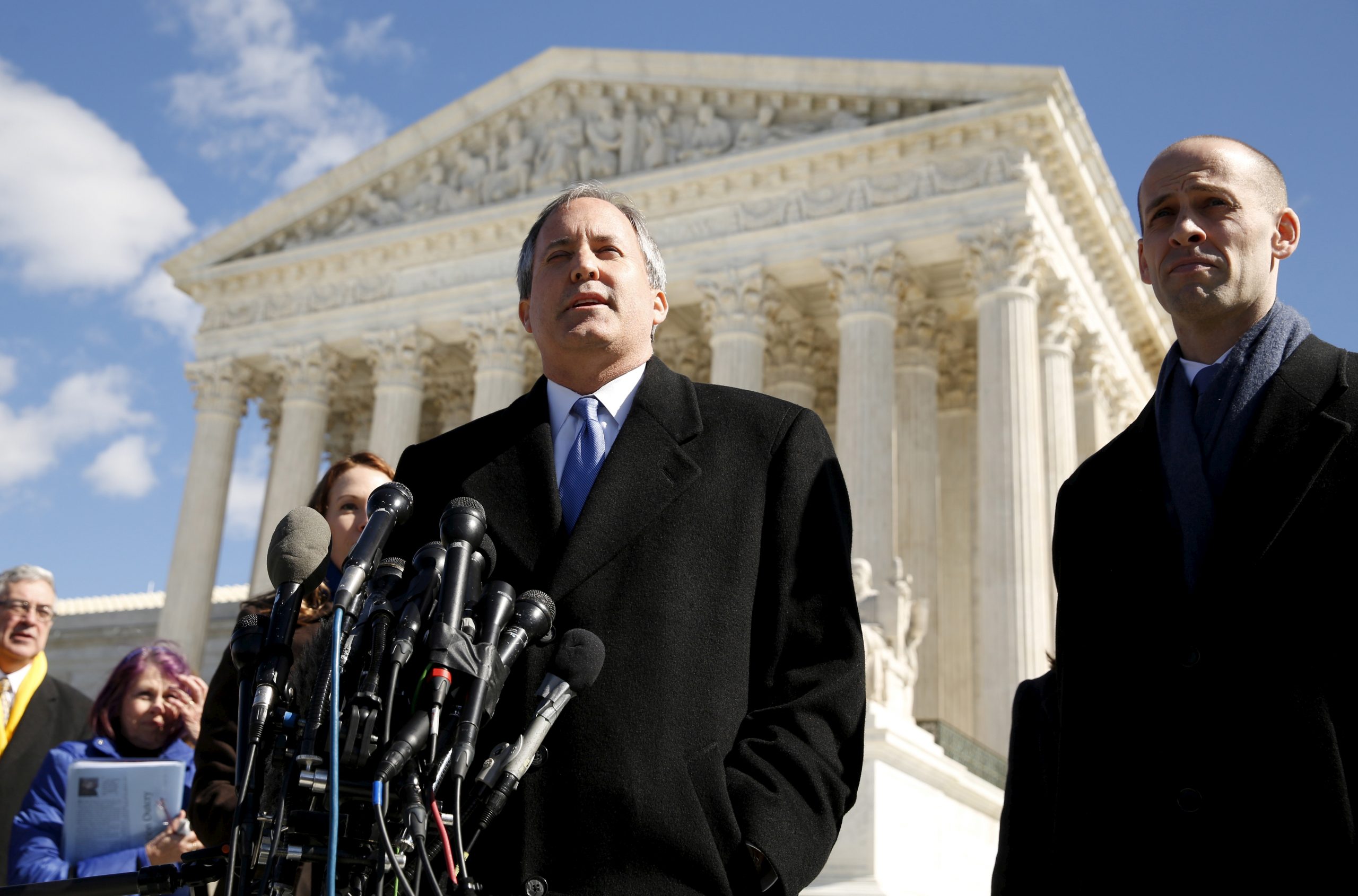The state of Texas on Tuesday asked the U.S. Supreme Court to throw out the voting results in four other states in a long-shot legal gambit intended to help President Donald Trump upend his election loss to President-elect Joe Biden.
Officials from the four states – Georgia, Michigan, Pennsylvania and Wisconsin – called the lawsuit a reckless attack on democracy while legal experts gave it little chance to succeed. It was filed directly with the Supreme Court rather than with a lower court, as is permitted for certain litigation between states.
The lawsuit, announced by the Republican attorney general of Texas Ken Paxton, targeted election battleground states that Trump lost to Biden after winning them in 2016. The Republican president has falsely claimed he won re-election and has made baseless allegations of widespread voting fraud.
Paul Smith, a professor and election law expert at Georgetown University’s law school, said Texas did not have a legitimate basis for the suit.
“There is no possible way that the state of Texas has standing to complain about how other states counted the votes and how they are about to cast their electoral votes,” Smith said.
The lawsuit represents the latest in a series brought by the Republican president’s campaign and supporters intended to reverse his loss to Democrat Biden in the Nov. 3 election. Those efforts so far have failed.
In another case, the Supreme Court on Tuesday rejected a bid by Pennsylvania Republicans to block the state from formalizing Biden’s victory there.
The Texas suit argued that changes made by the four states to voting procedures amid the coronavirus pandemic to expand mail-in voting were unlawful. Texas makes the remarkable request of the Supreme Court to immediately block the four states from using the voting results to appoint presidential electors to the Electoral College, essentially erasing the will of the voters.
Biden has amassed 306 electoral votes – exceeding the necessary 270 – compared to Trump’s 232 in the state-by-state Electoral College that determines the election’s outcome, while also winning the national popular vote by more than 7 million votes. The four states contribute a combined 62 electoral votes to Biden’s total.
Electors in the Electoral College typically are party loyalists who pledge to vote for the candidate who wins a state’s popular vote. Texas wants the legislatures in the four states to appoint their own slate of electors instead of relying upon the verdict delivered by voters.
Texas also asked the Supreme Court to delay the Dec. 14 date for Electoral College votes to be cast, a date set by law in 1887.
Democrats and other critics have accused Trump of aiming to reduce public confidence in U.S. election integrity and undermine democracy by trying to subvert the will of the voters.
“The erosion of confidence in our democratic system isn’t attributable to the good people of Michigan, Wisconsin, Georgia or Pennsylvania but rather to partisan officials, like Mr. Paxton, who place loyalty to a person over loyalty to their country,” Michigan’s Democratic Attorney General Dana Nessel said.
Paxton, an ally of Trump on a range of issues, faces allegations in Texas of bribery and abuse of his office to benefit a political donor, according to local media.
A CONSERVATIVE COURT MAJORITY
The Supreme Court’s 6-3 conservative majority includes three justices named by Trump. The president said before the election he expected the Supreme Court to decide the winner.
The justices are not obligated to hear the case. The court has made clear that its “original jurisdiction,” which lets it directly hear litigation between states, should be invoked sparingly.
Texas accused election officials in Georgia, Michigan, Pennsylvania and Wisconsin of failing to protect mail-in voting from fraud, diminishing “the weight of votes cast in states that lawfully abide by the election structure set forth in the Constitution.”
Voting by mail surged during the pandemic, as many Americans stayed away from polling places to avoid the spread of COVID-19. State officials have said they have found no evidence of the widespread election fraud alleged by Trump.
Election disputes are meant to be resolved by members of Congress when they meet on Jan. 6 to formally count Electoral College votes, constitutional law professor Ned Foley of Ohio State University’s Moritz College of Law said.
“I would think the court would not want to be dragged into the middle of this,” Foley added.
Trump retweeted several Twitter posts expressing support for the lawsuit, including two that called for other states to join it.
Pennsylvania Attorney General Josh Shapiro, a Democrat, said, “These continued attacks on our fair and free election system are beyond meritless, beyond reckless.” Wisconsin Attorney General Josh Kaul, a Democrat, called the lawsuit “genuinely embarrassing.”
A spokeswoman for the office of Georgia Attorney General Chris Carr, a Republican, said: “With all due respect, the Texas Attorney General is constitutionally, legally and factually wrong about Georgia.”
Tuesday represented a “safe harbor” early deadline under the law for states to certify the election results.
(Reporting by Makini Brice, Jan Wolfe and Lawrence Hurley in Washington; Additional reporting by Tom Hals in Wilmington, Delaware; Editing by Will Dunham and Noeleen Walder)
























